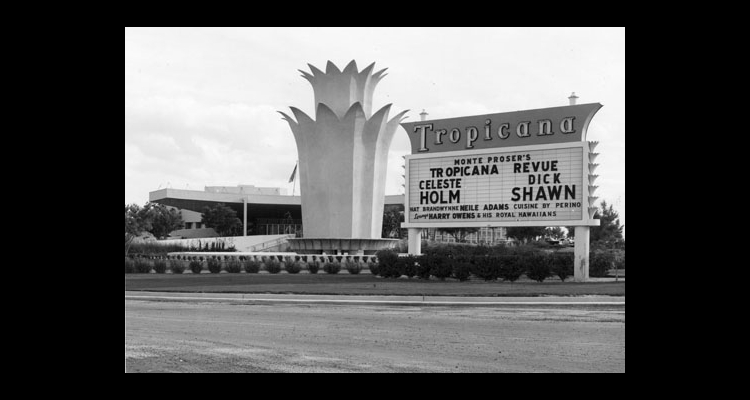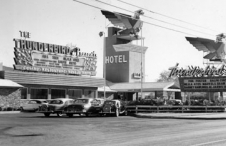John Kell Houssels
John Kell (J. Kell) Houssels, Sr. (1895-1979) turned a small card parlor on Fremont Street in downtown Las Vegas into a gambling club, and over the next four decades he became one of the most respected operators of casinos in Southern Nevada, including the El Cortez, Showboat, and Tropicana.
Houssels, who trained as a biplane pilot during World War I, graduated from the Colorado School of Mines in 1922. After working as an assayer in copper mines in Ely, Nevada, he moved to central California. He later took a chance and brought his young family to Las Vegas in 1929. With $6,000, he bought a one-third interest in a legal poker room and parlor called the Smokehouse on Fremont Street downtown. He renamed the place the Las Vegas Club.
When the state legalized casino gambling in 1931, including bank games such as craps, roulette and slot machines, Houssels was among the first of several applicants in Las Vegas to obtain a casino license. Houssels and original partners J. W. Horden and A. F. Gillmore remodeled the club into a small casino. He soon became one of the early major players in the town's new gambling business, centered on Fremont Street. One of his other early investments was in the Boulder Club casino downtown.
In 1941, Houssels partnered with John Grayson from California, and Marion Hicks, a Los Angeles architect and developer, to build and operate the El Cortez Hotel-Casino on east Fremont Street. With investors Guy McAfee and A.W. Ham, Houssels also acquired property on the east side of Highway 91 (later the Las Vegas Strip) between the El Rancho Vegas and the Last Frontier casino resorts.
Houssels would enjoy much success in the year following the close of World War II. In December 1945, Houssels and his partners sold the El Cortez to a group that included Moe Sedway, Gus Greenbaum, Dave Berman, and, behind the scenes, Meyer Lansky and Benjamin "Bugsy" Siegel, all of whom had ties to organized crime. But in early 1946, the new owners asked Houssels back, and he leased the casino from them with Ray Salmon of Utah. In March, 1946, Houssels sold his interest in the land on Highway 91 to Hicks and Clifford A. Jones, who would use the location to build the Thunderbird Hotel, which opened there in 1948.
Houssels and Salmon announced a $250,000 expansion of the El Cortez in May 1946, which meant adding a barber shop, a swimming pool, a nightclub, and a four-story wing. Later that year, Houssels took over full ownership of the Las Vegas Club on Fremont Street, with Greenbaum holding on to an interest in the race book.
Houssels also owned pieces of a bus company, a taxicab firm, and in the downtown area, the Overland Hotel and a popular drive-in eatery called the Round-Up. For years an avid racer of thoroughbreds, he had stables for thirteen horses at a racetrack in California in the late 1930s. Houssels was named president of the Nevada Racing Association in 1939. In 1945, one of his horses, Bymeabond, won the Santa Anita Derby in California, and Houssels pocketed the $50,000 in prize money.
In 1947, Houssels accepted Benny Binion, a former illegal gambler from Dallas, as a partner in the Las Vegas Club. That same year, Houssels and Binion put up $25,000 in bail to secure the release of a club security guard who was charged with shooting and killing a man there. Houssels, however, soon sold his interest in the Las Vegas Club.
Houssels became a topic of discussion in local political circles in the late 1940s. Some local business people, led by Charles Popkin, complained that several of the city's casino club owners held too much influence with Mayor Ernie Cragin. Popkin said there was a "Houssels Machine" that obtained unfair favors from city hall that benefited their businesses. While Houssels did make his views known to city officials about local development, he had little control over the growth that occurred in Las Vegas during post-war years.
Houssels returned to running the El Cortez in 1952, owning a piece of the profits along with twelve other investors including his lawyer son, J. K. Houssels, Jr., and William "Bill" Moore, who had started the Last Frontier resort in the early 1940s.
On September 3, 1954, Houssels joined Moore and partner Joe Kelley in launching the Showboat, a hotel-casino themed after a Mississippi Riverboat. Houssels' group managed the hotel. A group from the Desert Inn resort on the Strip operated the casino, including Moe Dalitz, Ruby Kolod, Clifford A. Jones, Morris Kleinman, and a former longtime Houssels employee, Joe Kelley.
The Showboat was in an unusual place—a couple of miles southeast of downtown Las Vegas on Boulder Highway, where Houssels and partners thought they could tap into motorists from Arizona. But though its partners were mistaken about business from Arizona, the Showboat evolved into a popular place for Las Vegas residents, and soon was considered the area's first casino catering to locals.
Allegations of organized crime involvement in Las Vegas hotel-casinos received national publicity throughout the 1950s. Houssels had been a partner with people with mob ties, such as Greenbaum and Sedway in the 1940s, and Moe Dalitz in the Showboat in the 1950s. However, local and state government officials regarded him as an independent, competent, and honest casino operator who was not directly in cahoots with the mobsters involved in Las Vegas casinos during those years.
His relatively clean reputation would bring him more success than ever in the late 1950s. In 1956, he, his son Kell Jr. and his wife, Jean, were among the partners who applied for state gaming licenses for minority interests in the planned Tropicana Hotel-Casino on the Strip. The builder was Conquistador, Inc., led by Phil Kastel, a former casino man from New Orleans. The Tropicana debuted on the Strip on April 3, 1957. Weeks later on May 2, a mobster named Frank Costello was shot and wounded in New York. An investigation revealed that hidden investors with connections to organized crime and Kastel were secretly receiving stolen shares of the Tropicana's cash profits. The state required the hotel to buy out and thus remove Kastel from the business, but sought to avoid closing the new resort down.
Houssels' acumen and repute prompted state officials to ask him to assume management of the resort's casino, and he accepted in 1957. He and his son took over managing all aspects of the resort in 1958. Under president and director Houssels, the Tropicana, after a brief down period, became a popular and opulent resort, nicknamed "the Tiffany of the Strip." He expanded the hotel property, adding an eighteen-hole golf course one block to the east, an Olympic-sized swimming pool, and lighted tennis courts. He also enhanced the hotel's entertainment offerings, overseeing the building of the hotel's elaborate main showroom and hiring show producer Lou Walters, who introduced the long-running Folies Bergere, a European musical and dance revue featuring beautiful showgirls wearing elaborate feathered costumes, in 1960.
In 1961, Houssels bought out the Desert Inn group's interest in the Showboat. In 1963, he sold the El Cortez to John "Jackie" Gaughan and Mel Exber for $4.3 million. He appointed his son president of the Tropicana in 1962, but stayed on as chief officer of the hotel until 1972, when the resort was sold to Deil O. Gustafson of Consolidated Financial Corp.
Houssels died in Las Vegas on May 2, 1979.
Article Locations
Related Articles
Further Reading
None at this time.



